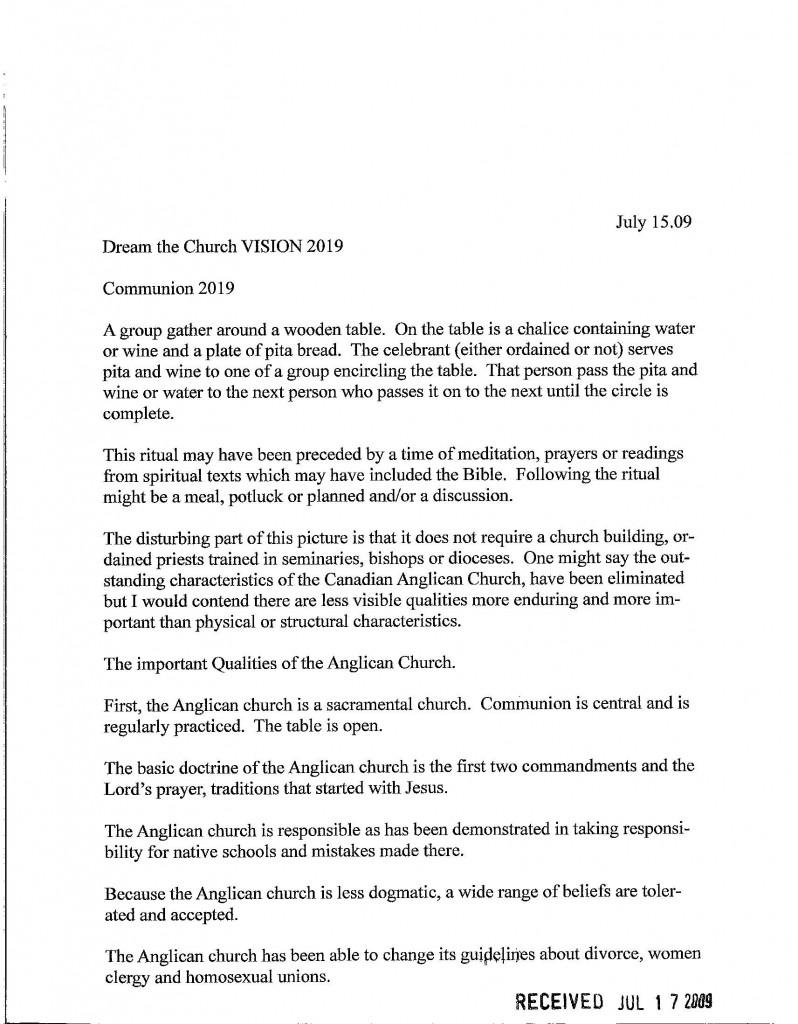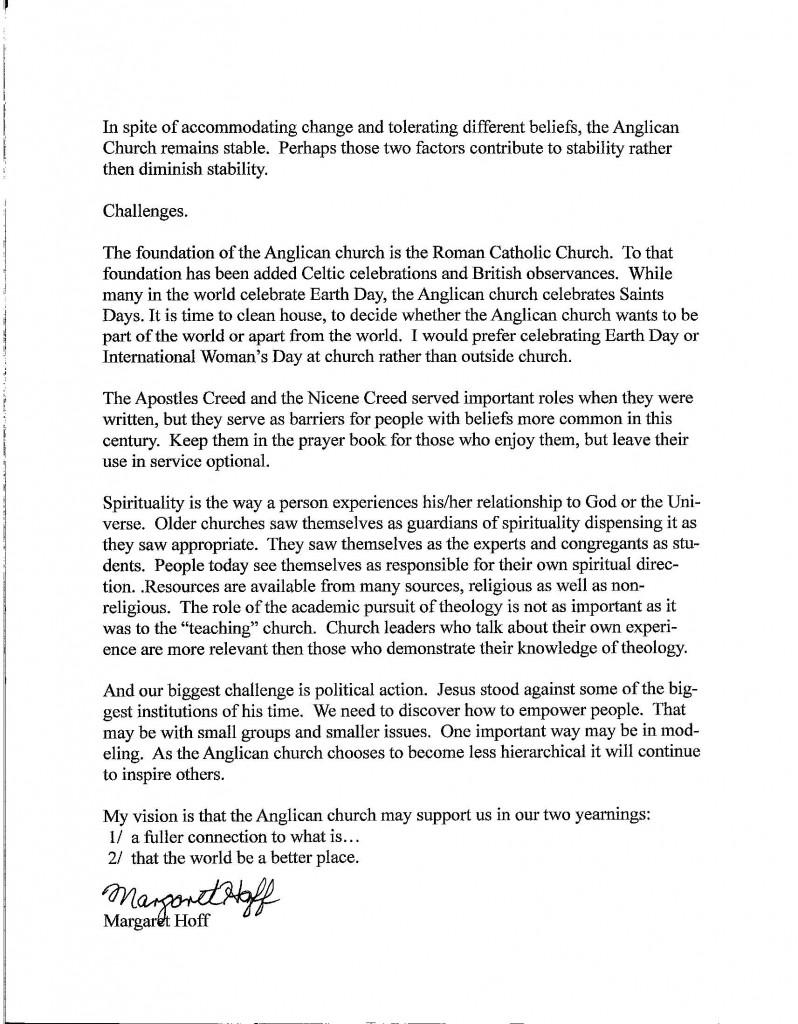I would like the Anglican Church to have stamped out homosexual clergy, and gay weddings long before that date. As well as taken a firmer stance on divorce. Thank you for your time.
Review responses from other Canadian Anglicans below (most recent responses are at the top). You can also view responses by diocese, and add your own story.
Message from Justin H., Fort St. John BC
Sent to us on August 7th, 2009Message from Rev Canon Baxter Park, Military Ordinariate
Sent to us on July 28th, 2009I am a military chaplain who has spent the last 20 years serving in this interfaith ministry. I have been lucky enough because of my postings to have served the church in a number of Canadian dioceses, in Europe and on operational postings around the world. I have come to value many things about the Anglican Church that I had previously taken for granted and I have come to the realization that some of the things that I once thought important or necessary are really trappings. When I have been in a position that has allowed it, I have worked hard to maintain my Anglican identity by helping at the local parish.
This summer I am again in the midst of a posting and moving away from a local congregation where I have been associated as an honorary priest for the past 3 years. In my final sermon in that place I used the Vision 2019 concept as the starting point for my sermon. In that sermon I suggested that there were 3 areas where I would like to see my church place some or greater emphasis in the next decade. All 3 of these are ministries mandated in the New Testament and at the core of Jesus ministry among us.
The first is the ministry of building relationships. Human beings are social creatures and in our increasingly technological world there are fewer and fewer human contacts. The extended family has been replaced with the extended friend list on Facebook. Your friendly neighbourhood bank teller has been replaced by a cash machine and online banking. Your checkout clerk at the supermarket has been replaced by an automatic checkout counter. You all know what is happening. Our small communities are disappearing. Our homes are being increasingly configured in such a way that the front porch has disappeared replaced by the privacy of the back deck. In this environment the church has the opportunity to be the place where everybody knows your name. We need to put a great deal more energy into building communities inside the walls of our churches. People who are longing for the contact of neighbours and an extended family need to be able to find it in the church.
The second ministry that we need to offer is the gift of hospitality. I have entered far too many Anglican churches in this country where people have been cold and aloof. We need to find ways to evangelize, to tell people who we are and what we have to offer. Just as importantly, we need to welcome people into the church as if they have come into our home. We need people to leave our worshipping communities for the first time feeling as if they couldn’t have gone to a better place. We have to get better at this and our motivation needs to be this: Do not neglect to show hospitality to strangers for in so doing some have entertained angels without knowing it. Hebrews 13:2.
And the final ministry that I would give greater emphasis is the ministry of healing. Most of us come to church looking for a message of hope and acceptance. We know that we have fallen short and we also joyfully know that God forgives and accepts us. God also empowers us with the ministry of healing and reconciliation. We need to place a greater emphasis on the restorative nature of God so that we can be an empowered and restored people. The oil of unction is our sacramental symbol of this. I am convinced that this oil should be resourced as commonly as bread and wine and water from our sacramental tool chest.
This is the direction I would like to see the church take in the next decade. There is nothing particularly radical or new. Rather, I see it as the recovery of some of the things that will make us more like the New Testament church and provide a real contrast between the ways of the world and THE WAY.
Commander Rev Canon Baxter Park
Military Ordinariate
Message from Anne M., New Westminster BC
Sent to us on July 28th, 2009Praying about this question, God answered in 3 parts -
1) FIRST PRAY, PRAY, PRAY. We need to ask God His plan – below July 7, 2009 devotion*. His ways are higher than our ways and the closing prayer in our eucharist reminds us that Ephesians 3:20 says He can do infinitely more than we can ask or imagine;
2) Could asking those of us who have left the Anglican church, why we did, help clarify a vision? I grew up in a loving, Christian family; was baptized and confirmed; gave my life to Jesus at 12; and, for most of my life attended Anglican church more often than weekly, as I was very involved in worship, youth ministry, and my parents have always lived exemplary role models for me. I loved working for Archbishop O’Driscoll as the Secretary-Treasurer in the Diocese of Huron for 6 years, except for the unbelievably painful journey through the residential school lawsuit.
My husband and I and the 3 kids in our blending family left the Anglican Church when God called us to stretch and learn in the Pentecostal Church. We followed God’s call across the country to Vancouver, and now we are learning at Willingdon Church, a Mennonite Brethren church in Burnaby, BC. I still consider myself an Anglican. I need change to grow in my faith and my relationship with God. Rick Warren says in his Purpose-Driven Life, God is interested in our character, not our comfort. Living in Vancouver teaches me that open doors and bridges are critical to thrive in a faith-based life. Is the Anglican Church opening doors to God and bridging ministries across the country and around the world?
3) Examine what difference the people of the Anglican Church are living today. Is the Anglican Church being salt and light? Are we feeding the hungry and fighting to rescue the oppressed as Isaiah 58 calls us to? What difference does the Anglican Church make in this hurting and confused world? Are we even relevant to a society distracted with the idols of materialism, sex, tolerance, health and fitness, and “eternal youth”? What would bring people who don’t know Jesus through the front doors to the Anglican Church?
I would be thrilled to see the Anglican Church flourish and grow exponentially to share the gospel with those all around us who need the hope and joy of knowing God loves us unconditionally. We would stretch into being more Christ-like as we open ourselves to compassion and loving others with the heart of God.
To God be the glory,
Anne Marie
*July 7, 2009 devotion in Our Daily Bread as follows:
“DOING THE WORK OF GOD
2 Corinthians 3:5 “Our sufficiency is from God.”
When I was a pastor I used to have a recurring nightmare. I would rise to preach on Sunday morning, look out at my congregation – and see no one in the pews! It doesn’t take a Daniel (Daniel 2:1,19) or a dream therapist to interpret the vision. It grew out of my belief that everything depended on me. I mistakenly believed that if I did not preach with power and persuasion, the congregation would fade away and the church would fold. I thought I was responsible for the results of God’s work.
In the Gospels, we read that some people asked Jesus, “What shall we do, that we may work the works of God?” (John 6:28). What audacity! Only God can do the works of God!
Jesus’ answer instructs us all: “This is the work of God, that you believe in Him whom He sent” (v. 29). Whatever we have to do, then, whether teaching a Sunday school class, leading a small group, telling the gospel story to our neighbor, or preaching to thousands, it must be done by faith. There is no other way to “work the works of God”.
Our responsibility is to serve God faithfully, wherever He has placed us. Then we’re to leave the results to Him. As Jesus reminded His disciples in John 15:5, “Without Me you can do nothing.” – David Roper
Reading John 6:25-33
Message from Margaret H., London ON
Sent to us on July 20th, 2009Message from Denise H., New Westminster BC
Sent to us on July 14th, 2009Message from David P., Whitehorse YK
Sent to us on July 14th, 2009Message from Merilee C., Diocese of Ottawa
Sent to us on July 14th, 2009Thank you for this opportuntiy to think outside the box and plan for the future.
I would like to see “Hospitality to All” be a theme within the churches. At our church, St. Thomas Stittsville, we have several groups and small buisnesses renting our facilities during the week. As the saying goes – hospitality begins at home, I would like to send a welcoming message to the 300 plus families who enter our doors during the week. These people come once or twice a week bringing their children to either the preschool or the after school learning center which teaches children 3 to 17 years. There is also an AA group that meets once a week. My idea would be for the dioceses to prepare a list of organizations that could come to speak or teach or display information on various subjects targeting the interests of the people who are using our facility as well as the general public. The church could then host one such meeting per month targeting the groups that meet in their church. An invitation personally delivered to each family would show that we care about their needs too. Especially in the outskirts of Ottawa it is very difficult to find or attend such information nights as “Teens and drugs”. First Words”, “Aging parents”, ” Families in Crisis” etc.
I hope this is an idea whose time has come. Thank you again
Blessings
Message from Peter D., Vernon BC
Sent to us on July 14th, 2009Vision 2019: Where I See Our Church in Ten Years’ Time.
Without a past there is no future. Our collective amnesia is one of the great threats to the church and to society as a whole. In order to envisage the future, we need to remember where we have come from. Canadian society has rapidly evolved from British colony to a multicultural society, widely regarded as one of the most successful in the world. Our church has also evolved rapidly. Until 1949 the Church of England in Canada, as we were then known, was still dependent on grants from the United Kingdom. Unlike the Episcopal Church in the United States, which was forced to stand on its own feet from 1776 on, Canadian Anglicans inherited a notion of ‘established church’, and with it the erroneous belief that somehow the state would finance it. Part of our history included the Upper Canadian vision that we should be established – out of which grew the battles between Strachan and Ryerson. In Quebec, of course, which until 1960 had two established churches (Roman Catholicism for the French-Canadians and a privileged Anglicanism for the English minority which controlled most of the financial institutions), the situation was somewhat different; but there was a widespread assumption that if you didn’t have an Anglo-Saxon name and white skin (unless you were an evangelised First Nations person) you couldn’t possibly be Anglican! It was not until 1955 that we changed our name (out of a growing recognition that it was a barrier to non-English immigrants and French-Canadians) from “Church of England in Canada” to “The Anglican Church of Canada/Ēglise Anglicane du Canada”. This was coupled with a desire to have a Canadian Book of Common Prayer to replace the 1662 version then in use. The first draft book of 1955 was deemed a bit too Catholic for what was still a largely Orange church. In 1959 a slightly revised book was unanimously approved by General Synod. It represented in many ways the end of the old hostilities between “High” and “Low” Anglicans. After the required approval by another General Synod in 1962 it became the official Canadian Book of Common Prayer. Already, however, we were into the sixties, and the winds of change were blowing. Almost immediately there were requests for more contemporary liturgies, and twenty years of “experimental liturgy” led to the 1985 Book of Alternative Services. Read the rest of this entry »
Message from Monica C, Ottawa, ON
Sent to us on July 14th, 2009WHERE IS YOUR CHURCH NOW?
1. The Anglican Church of Canada has been seriously weakened by the gay marriage dispute, losing both clergy, congregations and individual members. I am sure that morally the right decision was made, but the costs will be very high and I, among others, am very ambivalent about it.
2. In my parish and the part of my diocese that I am aware of, we have an aging membership which is not being replaced by younger members.
3. I feel that we do not project a clear image of our beliefs and what we stand for; rather, we are “not this” or “not that”.
4. In an effort to please everyone, we have not developed a realistic plan to cut our losses and build on the strengths of more successful parishes. Cutting losses means closing down sinking parishes, selling church sites and re-investing the money in fewer, stronger parishes and social services. This is poor planning and poor business practice.
5. On a positive note, there are successful, thriving parishes which, through hard clergy and parishoner work, are slowly growing and offering a wonderful level of support to their members. These parishes should be identified and used as models.
WHERE DO YOU WANT THE ANGLICAN CHURCH OF CANADA TO BE BY 2019?
We should be:
- smaller but stronger
- community-centred
- ecumenical
- youth-friendly
- strong social advocates for our parish and community
We should return to the essentials of primitive Christianity, practicing the principles of
- love
- peace (actively anti-war)
- caring
- actively anti-poverty
- the light of the world
- the salt of the earth
- the leaven in the loaf
in short, de-institutionalize ourselves so that we can show Canada and the world why the practice of the Christian faith is beautiful, freeing and the only answer to the hate and violence of the contemporary world.
Sadly, we compromise Christian beliefs and principles every day so as to appear “patriotic”, “with the tour”, “not making waves”, “cool”. We have become too respectable and it is killing us. Our aim should be to be a leader and example in Canada of how a true Christian should live. Christianity was never meant to be comfortable. Maintaining our status quo is not a viable option,as it will lead us to total irrelevancy and slow death.
I say these things as a passionate, lifelong Anglican who still has great hopes and expectations of my church.





